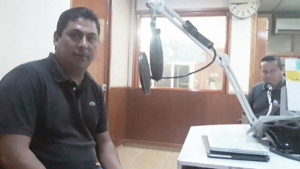On 18 May 2017, Salvador was abducted by a group of armed men outside the water purifying plant in Nueva Italia where he worked. Five weeks later, on 26 June, his burned remains were found in Barranca del Diablo, in the neighbouring municipality of Gabriel Zamora.
Salvador was born on 29 April 1972 in Apatzingán. He attended Universidad Michoacana de San Nicolás de Hidalgo, where he studied law. However, he did not become a lawyer and instead worked as a journalist for almost 25 years. He was the director of 6tv Tu Canal, which he established on 25 June 2010 together with his father in law Francisco Javier Urtiz, a veteran journalist and a pioneer of television in the Tierra Caliente region.
“My husband said things directly, he was known for this and this is why TV viewers identified with him. He was an investigative journalist. He criticized the government harshly, not just in Michoacán; he delivered conclusive evidence and gave the right to reply”, recalls his wife Frida Urtiz Martínez.
Antonio Ramos Tafolla, managing director of the weekly newspaper El Regional, noted that Salvador was a critical journalist who had strong opinions. “I told him several times to be more moderate, because he spoke very forcefully, and this cost him his life”.
Practising journalism in Michoacán is difficult and treacherous, according to Ramos. This has led many journalists to self-censor, especially in dangerous areas like Tierra Caliente, where Salvador worked.
“Salvador left us a legacy, not in money, but in waking with courage, honour and the desire to keep living with your head held high”, his widow said. “We know that an upstanding man protected us, someone with faults like everyone, but with more virtues”.
Source: Matar a Nadie
